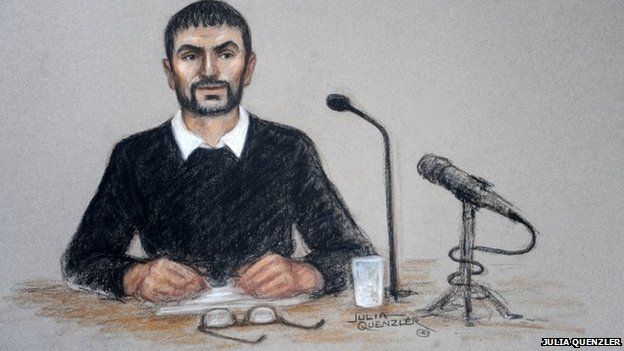Erol Incedal secret terror trial guilty verdict revealed
- Published

Law student Erol Incedal was found guilty in a terror trial partially held in secret of possessing a bomb-making document, it can now be reported.
Judge Mr Justice Nicol lifted an order he had made that prevented the media reporting last Tuesday's guilty verdict against 26-year-old Incedal.
The Old Bailey jury failed to reach a verdict on a charge of committing acts preparatory to terrorism.
Incedal, from London, provisionally faces a retrial on this charge.
He had denied all allegations against him.
The jury was discharged after it failed to reach a verdict on the second charge, which involved preparing an act of terrorism with others abroad.
His co-defendant, Mounir Rarmoul-Bouhadjar, 26, pleaded guilty before the trial began to possession of a bomb-making document identical to the one Incedal had.
During the trial, the Old Bailey had heard claims Incedal was considering an indiscriminate Mumbai-style terror attack and had an address for a property owned by ex-Prime Minister Tony Blair and his wife Cherie.
Secret evidence
Jurors had heard Incedal was stopped by police on 30 September last year on suspicion of driving too fast in his black Mercedes with no licence or insurance.
Officers found a piece of paper in his car with the address of a property belonging to Mr and Mrs Blair.
A bug was planted in the car and Incedal was later monitored talking about a "Plan B".
On 13 October, Incedal was stopped in his car again and arrested on suspicion of being a terrorist.
Police searched his home in south London and found notes on a "Plan A".
In a second property near Paddington, central London, police found a laptop with apparently coded messages believed to be about a Mumbai-style attack and a Kalashnikov rifle, the court was told.
Police also found a photograph of a synagogue on his phone, along with an internet search history that included YouTube pages on the extremist group Islamic State.
Incedal denied planning an attack. He admitted possessing a memory card that contained a bomb-making document, but said he had a reasonable excuse for it.
The majority of the trial was heard behind closed doors. Some evidence was heard completely in secret, some with accredited journalists who could not report on proceedings and some in open court.